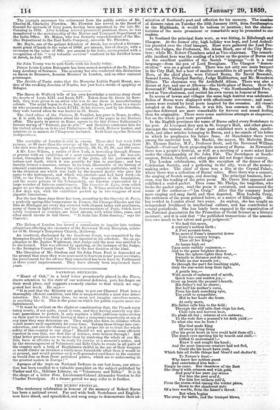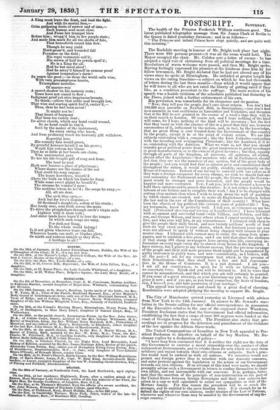THE EVENS' FESTIVAL. The centenary celebration in honour of the
memory of Robert Burns has been a national event. Far and wide both Seotehmen and English- men have dined, and speechified, and sung songs to demonstrate their ad- miration of Scotland's poet and affection for his memory. The number of dinners eaten on Tuesday the 25th January 1859, from Southampton te the Highlands, it would be tedious to mention ; but the charac- teristics of the more prominent or remarkable may be presented to our readers.
In Scotland the principal feats were, as was fitting, in Edinburgh and Glasgow. At the former city, high holiday was kept, and Lord Ardmil- lan presided over the chief banquet. Here were gathered the Lord Pro- vost, the Jw1gea, the Professors, Mr. Adam Black, one of the City Mem- bers; while Mr. Robert Chambers acted as Vice-chairman. The remark- able incident here was the reading of a letter on the genius of Burns and on the excellent qualities of the Scotch "language "—it is a real language—from the pen of Lord Brougham. The Glasgow " demon- stration " was on a grand scale. There was not only one main banquet in the City Hall, but a host of smaller assemblies in all parts of the city. Here, at the chief place, were Colonel Burns Sir David Brewster, Samuel Lover, Principal Barclay, Judge Hallibuiton, and Mr. Monckton Macs. The chairman was Sir Archibald Alison. There was also a dinner at Ayr, and one at .Alloway—the birth-place of Burns. Here the Reverend P. Waddell presided; Mr. Story, "the Northumberland Poet," acted as Vice-chairman, and recited his own verses in honour of Burns.
In scores of towns and villages the same high festival was celebrated. Relies of Burns were displayed with affectionate reverence ; and many poems were recited by local poets inspired by the occasion. All classes mingled at the feasts; Burns, it was felt, was common to all. The speeches delivered are more remarkable for fervour and sound feeling than for originality. There were some ambitious attempts at eloquence, but on the whole good taste prevailed.
In the English provinces the name of Burns called every Scotehman to his post. At Liverpool they met in St. George's Hall, and other places. Amongst the various relics of the poet exhibited were a chair' candle- stick, and other articles belonging to Burns, and a fac-simile of his letter in which he prophesies his future fame. At Manchester there were among the convivial host, Mr. Mackie, the mayor, Mr. Malcolm Ross, Mr. Thomas Bazley, M.P., Professor Scott, and the Reverend William Gaskell—Professor Scott proposing the memory of Burns. At Newcastle there was a people's festival, as well as a meeting of a more select kind under the chairmanship of Sir John Fife. The Scotchmen at South- ampton' Bristol, Oxford, and other places did not forget their country. The London celebrations, with the exception of the dinner of the Caledonian Society, and a gathering in the city, were of the money- making order. The chief of these was a fete at the Crystal Palace, where there was a collection of Burns' relics. Here there was a concert, the singing of Scotch songs, and dancing. The principal business, how- ever, was the reading of the prize poem. Mr. Grove first appeared and exhibited a sealed packet. Then came Mr. Phelps, the tragedian, who broke the packet open, read the poem it contained, and announced the name of the authoress—"Isa Craig." After this the company heard more singing and sang itself, and then departed. Miss Isabella Craig, the authoress of the poem printed below, is a native of Edinburgh. She has resided in London about two years. An orphan, she has sought an independent livelihood in intellectual culture, and has contributed to several periodicals. She has lately .been engaged in the organization of the National Association for the Promotion of Social Science as a literary assistant; and it is said that "the published transactions of the associa- tion owe much to her talent and good judgment."
"We hail this morn,
A century's noblest birth ;
A Poet peasant-born, Who more of Fame's immortal dower Unto his country brings, Than all her Kings !
As lamps high set
Upon some earthly eminence,—
And to the gazer brighter thence
Than the sphere-lights they flout,—
Dwindle in distance and die out, While no star waneth yet; So through the pas' t far-reaching night, Only the star-souls keep their light.
A gentle boy,—
With moods of sadness and of mirth,
Quick tears and sudden joy,—
Grew up beside the peasant's hearth. His father's toil he shares; But half his mother's cares, From his dark searching eyes, Too swift to sympathise,
Hid in her heart she bears.
At early morn, His father calls him to the field ; Through the stiff soils that clogs his feet, Chill rain and harvest heat, He plods all day ; returns at eve outworn, To the rude fare a peasant's lot doth yield ;— To what else was he born ?
The God made King
Of every living-thing
(For his great heart in love could hold them all) ; The dumb eyes meeting his by hearth and stall,— Gifted to understand !- Knew it and sought his hand ; And the most timorous creature had not fled, Could she his heart have read,
Which fain all feeble things had bless'd and shelter'd. To Nature's feast—
Who knew her noblest guest
And entertained him best— Kingly he came. Her chambers ef the East
She drap'd with crimson and with gold, And pour'd her pure joy-wines For him the poet soul'd. For him her anthem roll'd,
From the storm-wind among the winter pines,
Down to the slenderest note
Of a lore warble, froM the linnet's throat.
But when begins The array for battle, bad the trumpet blows, A King must leave the feast, and lead the fight.
And with its mortal foes,— Grim gathering hosts of sorrow and of sins,—
Each human soul must close.
And Fame her trumpet blew
Before him ; wrapp'd him in her purple state, And made him mark for all the shafts of fate, That henceforth round him flew.
Though he may yield Hard-press'd, and wounded fall Forsaken on the field ; His regal vestments soird ;
His crown of half its jewels spoird ;
He is a King for all. Had he but stood aloof !
Had he array'd himself in armour proof Against temptation's darts ! So yearn the good ;—so those the world calls wise, With vain presumptuous hearts, Triumphant moralise.
Of martyr-woe A sacred shadow on his memory rests ; Tears have not ceased to flow ; Indignant grief yet stirs impetuous breasts, To think,—above that noble soul brought low, That wise and soaring spirit fool' d, enslav'd,— Thus, thus he had been saved !
It might not be !
That heart of harmony
Had been too rudely rent ;
Its silver chords, which any hand could wound, By no hand could be tun'd, Save by the maker of the instrument, Its every string who knew, And from profaning touch his heavenly gift withdrew.
Regretful love
His country fain would prove'
By grateful honours lavish 'd on his grave ; Would fain redeem her blame That he so little at her hands can claim, Who unrewarded gave To her his life-bought gift of song and fame.
The land he trod Rath now become a place ofpilgrimage ; . Where dearer are the daisies of the sod That could his song engage. The hoary hawthorn, wreath'd Above the bank on which his limbs he flung While some sweet plaint he breath'd ; The streams he wander'd near;
The maidens Whom he lov'd ; the songs he sung ;—
All, all are dear.
The arch blue eyes,— Arch but for love's disguise,—
Of Scotland's daughters, soften at his strain ; Her hardy sons, sent forth across the main To drive the ploughshare through earth's virgin soils Lighten with it their toils ; And sister lands have learn'd to love the tonguo In which such songs are sung.
For doth not Song, To the whole world belong! Is it not given wherever tears can fall, Wherever hearts can melt, or blushes glow, Or mirth and sadness mingle as they flow, A heritage to all ? "



























 Previous page
Previous page